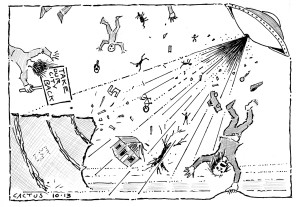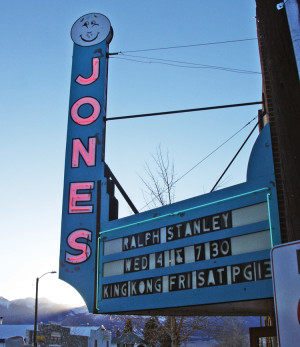By Martha Quillen
I’m an American, a Coloradan, a Salidan, and a resident of Chaffee County. I’m also a resident of a Colorado congressional district, a Salida city precinct, a hospital district and the R-32-J School District. As is true of most Americans, I am a citizen in a host of participatory democracies, which one would presume must share some common goals.
But sometimes in the course of human events the citizens just can’t seem to agree upon their goals. This has been especially noticeable in Salida of late as contradictory messages have sprouted in the pouring rain. “Take Our City Back, Save Salida,” a row of placards advises, countered by a bevy of “Keep Salida Moving Forward” missives.
I don’t love any of the signs because they are evidence of our tendency to build conflict rather than consensus. These two sides aren’t negotiating; they are trying to build armies, and their signs are recruitment posters.
Salida Citizens for Accountable Government (CAG), is responsible for the Take Our City Back signs, and has charged the Salida Council with being secretive and profligate. Keep Salida Moving Forward is often called a Salida City Council booster, and was formed to counter CAG’s position.
Monika Griesenbeck, a CAG member, recently accused the council of violating the law by failing to publish public records, and the council subsequently admitted that it hadn’t posted the city’s bills in a newspaper of general circulation in accordance with the law for many years. But the city claims that was just an oversight, and maintains it’s an antiquated law anyway. The council’s nonchalance about violating Colorado open records law seems tailor-made to fuel CAG’s distrust, but it hasn’t fazed its supporters.
I hate this sort of local showdown. In fact, for several decades I’ve hoped that Christo would just move his project forty miles downriver so that Cañon City would have to deal with it.
And in this case? Monika is a friend, as are at least a dozen of the people with Keep Salida Moving Forward signs in their yards. Friendship is fragile and frequently doesn’t survive conflict, as is friendliness, which is one of the amenities people move to small towns seeking.
This controversy leapt into rough territory when it quit being about budgets and records and started being about the citizens’ manners. It’s not diplomatic to call a person rude – even if he is – because insulting him won’t help you settle anything. And labeling entire groups of citizens as rude seems even more undiplomatic. But that’s the course Moving Forward has chosen.
Instead of just detailing the accomplishments and merits of the council, they insist that the citizens should be grateful. But the idea that citizens should thank a council that they believe is ruining their town is bizarre.
It would be nice if everybody would put away their Manner-O-Meters and think about Salida’s real problems. Except once the subject was introduced, I got obsessed, too. I watched a city council meeting on television and thought, “Those people are reading right through that man’s presentation, that’s so rude.” Then I started noting whom the mayor greeted enthusiastically and whom he didn’t, and nasty looks, and undue noise in the room.
But this obsession is absurd. Salida’s got bigger problems.
In recent years, our local governments have been spending at a brisk and heady rate. In Salida, we have three new schools, a new hospital, a sewer treatment plant and the NRCDC building. Our city government has moved to greatly expanded quarters with lovely grounds; we’ve redesigned our river, have a new convention center, and are improving the city’s water treatment facilities.
But our demographics are dismal. Salida’s workers are poorly paid; local jobs tend to be deficient in benefits; and residents are hard-pressed to find affordable housing. According to the U.S. Census Bureau’s Quickfacts website (2012 posting), the 12-month per capita money income in Salida (in 2011 dollars) was $24,285, as compared to $26,795 for Chaffee County and $30,816 for Colorado. The median household income in Salida was $37,600, and in Chaffee County it was $43,684, and in Colorado $57,685.
For a few years, Salida was growing fast, looking good, enjoying prosperity, and expecting a big boom. In the 1990s, Coloradans kept trooping off to Smart Growth Summits to determine how they were going to handle all of the bustle heading their way, but Salida didn’t grow. Its population was 5,504 in 2000 and 5,317 in 2012.
The only things that have really boomed in Salida in the last twenty years are our city’s budget and its tourist attractions.
After the 2008 crash, a lot of Salidans economized by deferring maintenance and “conserving” water. Weeds bloomed, trees died and porches crumbled. Today, dream homes continue to rise on Salida’s west side, but more homeless people are camping in the nearby Ark hills, and the growing gap between the rich and the poor in our community has become all too visible.
The Moving Forward contingent is upset about CAG’s attitude, but CAG members aren’t the only people complaining about how Salida is being run. Every summer I hear a stream of complaints about what Salida has become:
“Our festivals used to be nice.” “FIBArk and the Fourth used to be about running into your friends and neighbors, not 50,000 strangers.” “Why do we have to have carnivals every weekend?” “The people moving here just want more and more stuff, so why didn’t they stay where there was more?”
Such comments tend to come from multi-generational Salidans who think our council is determined to turn their hometown into another Vail or Breckenridge.
Personally, I think the council’s plans are more likely to turn Salida into Pagosa Springs East, or if there’s another glitch in the national economy while Salida is carrying so much debt, into Friend Ranch II.
Perhaps the huge surge in Salida’s public spending will eventually serve all of the city’s population, but it’s doubtful. For more than three decades, America’s working classes have been sinking and we haven’t managed to do anything about it. The consequences of the growing gap between America’s rich and poor is the subject of Joseph Stiglitz’s latest book, The Price of Inequality: How Today’s Divided Society Endangers Our Future.
Stiglitz, a winner of the Nobel Prize in Economics, contends that our belief in upward mobility and “the American dream” is rapidly eroding, which is leading to the sort of class tension that once plagued European countries. According to Stiglitz, our “social cohesion” is giving way to “a new divisiveness,” which is something you can easily see here in Salida, where citizens have taken to posting their differences on signs.
The downward drift of America’s middle class has been long and steady, and Salida’s demographics show that our citizens are closer to the bottom than most. Although we live in the same town, we don’t all share the same circumstances, resources or opportunities. So it’s not surprising that Salidans are sometimes testy with one another.
But you would think that our city council could forge some reasonable compromises between our divergent residents. Perhaps the council could set aside plans for costly new projects for awhile and hire more Salidans to beautify and maintain what we already have – because if there’s something Salida definitely doesn’t have any shortage of, it’s people looking for work.
In my view, we desperately need some new people with different ideas on the Salida City Council, not to dominate it, but to make it more representational. And once Salidans feel more represented by their council, maybe their signs will all proclaim, “Thank You, Salida City Council.”
Martha Quillen has lived in Salida for thirty-five years and enjoys the new trails and river walk but sometimes misses the simpler life that mountain towns used to offer.



